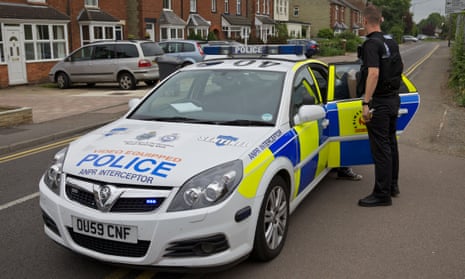Britain’s network of number plate recognition cameras amounts to “one of the largest data gatherers in the world” and threatens to spark a public outcry against police mass surveillance, the CCTV commissioner has warned.
Tony Porter, the former assistant chief constable in charge of counterterrorism at the 2012 Olympics, said police chiefs faced a backlash over the potentially illegal way they were operating number plate recognition cameras.Repeated refusals by police to release information about the scope and scale of the system were “not acceptable”, and likely to encourage a public response similar to that prompted by Edward Snowden’s revelations about data gathering by security services.
“The political fallout of an ill-conceived system that is not publicised is potentially significant … think about Snowden,” Porter told the Association of Crime Commissioners. His concerns are echoed by a government adviser on transparency who warns that police appear to be illegally retaining number plate data for up seven years.
Porter expressed frustration at the refusal of police to publish details about the number and location of automatic number plate recognition (ANPR) cameras, and evidence of their effectiveness. “Given the large-scale data acquisition of such a system, I find this surprising,” he told the Guardian.
In his annual report published last week, Porter said: “I have openly called for greater transparency from the police relating to the numbers of ANPR cameras deployed and any evidence relating to their efficiency and effectiveness to also be published.

“It is not acceptable to have to rely on submitting freedom of information requests. Police forces should be willing to publish this information on websites and engage in debates around its usage.”
The rapidly expanding ANPR system has led to a network of an estimated 8,300 cameras making 30m “reads” of number plates across the country each day, or more than 10bn reads a year.
Civil liberty groups point out there is no statutory basis for the creation of a national number plate recognition database, under which data about drivers’ movements is retained for at least two years.
In a speech published on Thursday, but given to a private meeting of ANPR operators last week, Porter warned police that “mining of meta-data – overlaying against other databases – can be far more intrusive than communication intercepts”.
He argued that public consent for the scheme was the police service’s “greatest priority”, as the system had a questionable legal basis. “Given the hugely successful ANPR operation are you, the police, happy that it should continue to operate outside of any legislative framework?”
Porter also warned ANPR operators that they may need authorisation under the Regulation of Investigatory Powers Act “once you start using [ANPR] to delve deeper into an individual”.
Former senior civil servant William Perrin, a member of the government’s transparency panel, urged the police to heed Porter’s call. Under a freedom of information request, Perrin asked the National Police Chief’s Council (NPCC) to explain the governance arrangements for ANPR.
In reply he was told: “There is no record which details the structure and governance of the ANPR.” Perrin said he was disturbed by that response. The FOI request also revealed that the police proposed to increase the retention of number plate data from two years to up to seven years.
In a letter to Porter, Perrin said: “I am concerned that the governance of the ANPR system is inadequate for billions of records, of which the vast majority will relate to innocent people’s private journeys.
“The police may well be acting unlawfully in storing data past their agreed two-year period, the proposals to extend to seven years are implausible against this background. If new guidelines are being drawn up it is wrong in principle to do this in secrecy.”
He also told Porter: “ANPR could be one of the world’s largest non-military surveillance systems and probably contains more data about people than the NHS. In principle, I support ANPR as a necessary system for public safety and crime fighting but governance of such a system is central to its safe operation.”
Porter said: “I have difficulty arguing with any of that. The public must be informed of as much information as possible if trust is to be maintained.”
Paul Kennedy, the NPCC’s lead for ANPRs, said the system was vital in the fight against crime and so the police could not be fully transparent about its use.
In a statement, Kennedy said: “ANPR has been used by police for over a decade and it is a vital tool both in the prevention and detection of crime including counterterrorism, homicide, and serious and organised crime. It also enables police to understand local crime patterns and has resulted in the arrest of some of the country’s most prolific and dangerous criminals. Police forces recognise their responsibility to protect people’s privacy too and carry a ‘privacy impact assessment’ for the deployment of cameras. This ensures that ANPR is used proportionately.
“We are balancing a desire to be as transparent as possible without giving away our tactics to criminals. A new ANPR network will be introduced next year using advanced technology which will enable greater control over all ANPR data and better oversight over where cameras are deployed.”
